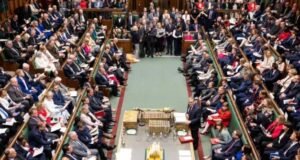
The European Union’s full devastating point-by-point rejection of Boris Johnson’s Brexit proposals for the Irish border has been revealed in documents obtained by the Guardian.
Leaked documents lay bare the scale of the multiple faults highlighted to David Frost, the prime minister’s chief negotiator, during the recent talks.
The disclosure follows the prime minister’s claim on Monday that he had not yet heard the EU’s thoughts on the legal text tabled by Downing Street, under which a customs border would be reimposed on the island of Ireland.
Under the draft text, which the UK has not published in full, Northern Ireland would stay in the EU’s single market for goods and electricity if Stormont consents, giving the DUP a veto before the arrangement comes into force and then every four years.
The confidential report chronicling the latest negotiations reveals:
The British have been warned that the proposed Stormont veto provides the DUP with an opportunity to block the all-Ireland regulatory zone from ever materialising.
The proposals for a customs border were said to risk a major disruption of the all-Ireland economy. EU negotiators have pointed out that it has been rejected by groups representing Northern Irish business.
The UK is seeking a fallback of no controls, checks and border infrastructure, even if the DUP vetoes Northern Ireland’s alignment with the single market. The bloc’s internal market would be left wide open for abuse, the European commission has said in its rejection of the proposal.
The UK’s proposal leaves it up to a joint EU-UK committee to work out how to avoid customs checks and infrastructure near the Irish border once there are two customs territories and sets of rules on the island of Ireland, without offering a plan B if no such solution is agreed.
The UK has called for reform of the common transit convention so as to avoid the need for new infrastructure in the shape of transit offices on either side of the border for the scanning of goods that have passed through multiple territories. Brussels has refused as it would lead other non-EU countries to seek similar exemptions, endangering the internal market.
The text affords what is seen as an unacceptable wholesale exemption for small and medium-sized businesses from customs duties and processes, but it fails to provide details on how to then combat smuggling.
On VAT, the British negotiators were told that the proposals fail to offer any solutions as to how to avoid payments and checks at the border.
Under the UK’s proposals all the state aid and level-playing-field conditions Theresa May agreed to in order to reassure the EU that Northern Ireland businesses would not enjoy a competitive advantage have been deleted. But Northern Irish firms would still be able to compete in the single market for electricity.
The UK would have access to an unlisted number of EU databases to allow it to police the customs border on the island of Ireland and the regulatory border between Great Britain and Northern Ireland. Whitehall would maintain such access even if the DUP vetoed alignment with the single market.
The EU’s hard-hitting rebuff was delivered to Frost on Friday and Monday, according to the leaked report, which was compiled following a briefing of EU diplomats by the commission.
The message had been passed on to Johnson in a series of phone calls with EU leaders over the weekend, during which Downing Street was left clear that the legal text did not form the basis for serious negotiation.
Following Monday’s discussions between Frost and the commission’s negotiating team, a UK government spokesman said it had offered the clarity that had been sought on the proposals.
Frost is understood to be staying in Brussels on Monday night but the EU has not yet agreed to negotiate on the detail, given what sources described as the “fundamental flaws”.
The British government spokesman said: “Following hours of discussions last week, the UK provided additional legal text today. This provided further technical detail on customs and goods regulations to further clarify how the UK’s proposals would operate.”
Boris Johnson claims EU has not explained why it objects to his Brexit plan
On Monday, the Brexit secretary, Stephen Barclay, met with the Dutch foreign minister, Stef Blok, who tweeted: “Frank & honest discussion today with Steve Barclay. As good neighbours do.
“Important questions still remain on UK Brexit proposals and more realism and clarity necessary this week. Full support for Michel Barnier.”
An EU commission spokeswoman said the EU27 remained of the opinion that the UK had failed to offer an alternative to the Irish backstop, which would avoid a hard border by keeping Northern Ireland in the single market and the EU’s customs territory.
She said: “We all agree that we need a workable solution now and not something based on untried and revokable arrangements that would be left to negotiation during the transition period.
“The UK’s proposals do not meet at present the objectives of the protocol on Northern Ireland/Ireland and this is the shared view of the EU parliament but also all member states.”
… we have a small favour to ask. More people are reading and supporting The Guardian’s independent, investigative journalism than ever before. And unlike many new organisations, we have chosen an approach that allows us to keep our journalism accessible to all, regardless of where they live or what they can afford. But we need your ongoing support to keep working as we do.
The Guardian will engage with the most critical issues of our time – from the escalating climate catastrophe to widespread inequality to the influence of big tech on our lives. At a time when factual information is a necessity, we believe that each of us, around the world, deserves access to accurate reporting with integrity at its heart.
Our editorial independence means we set our own agenda and voice our own opinions. Guardian journalism is free from commercial and political bias and not influenced by billionaire owners or shareholders. This means we can give a voice to those less heard, explore where others turn away, and rigorously challenge those in power.
We need your support to keep delivering quality journalism, to maintain our openness and to protect our precious independence. Every reader contribution, big or small, is so valuable
 Weekly Bangla Mirror | Bangla Mirror, Bangladeshi news in UK, bangla mirror news
Weekly Bangla Mirror | Bangla Mirror, Bangladeshi news in UK, bangla mirror news







